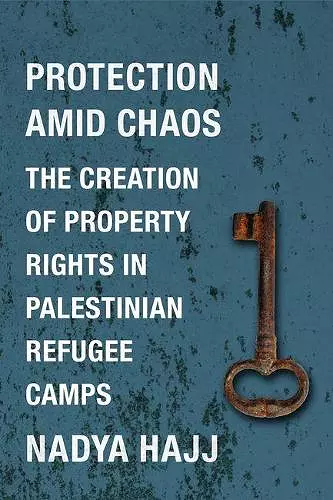Protection Amid Chaos
The Creation of Property Rights in Palestinian Refugee Camps
Format:Hardback
Publisher:Columbia University Press
Published:13th Jan '17
Currently unavailable, and unfortunately no date known when it will be back

The right to own property is something we generally take for granted. For refugees living in camps, in some cases for as long as generations, the link between citizenship and property ownership becomes strained. How do refugees protect these assets and preserve communal ties? How do they maintain a sense of identity and belonging within chaotic settings? Protection Amid Chaos follows people as they develop binding claims on assets and resources in challenging political and economic spaces. Focusing on Palestinians living in refugee camps in Lebanon and Jordan, it shows how the first to arrive developed flexible though legitimate property rights claims based on legal knowledge retained from their homeland, subsequently adapted to the restrictions of refugee life. As camps increased in complexity, refugees merged their informal institutions with the formal rules of political outsiders, devising a broader, stronger system for protecting their assets and culture from predation and state incorporation. For this book, Nadya Hajj conducted interviews with two hundred refugees. She consults memoirs, legal documents, and findings in the United Nations Relief Works Agency archives. Her work reveals the strategies Palestinian refugees have used to navigate their precarious conditions while under continuous assault and situates their struggle within the larger context of communities living in transitional spaces.
Nadya Hajj asks an important question - namely, why and how do property rights get institutionalized in "transitional" contexts? With so many places in the world characterized by unpredictability and uncertainty, this question resonates far beyond the Palestinian refugee camps of Lebanon and Jordan. Based on a treasure trove of data from in-depth interviews and original documents, among other sources, Hajj traces the evolution of property rights in the camps over time, showing how they evolved from informal understandings of ownership to formal legal claims as Palestinians sought greater predictability in their lives. These strategies, however, had ambiguous effects: On the one hand, the formalization of property rights afforded refugees a measure of protection. On the other, they exposed them to greater control by external actors such as the Jordanian state, the Lebanese military, and the Palestinian Fatah. Hajj's impressive work sheds light on a critical and enduring question of great consequence for macro-level development outcomes and for micro-level concerns of people living in uncertain conditions. -- Melani Cammett, Harvard University Hajj has written an outstanding book on the politics of Palestinian property rights in the refugee camps in Jordan and Lebanon. With careful precision, Hajj documents the circumstances that resulted in the degree of Palestinian property rights formalization across the various camps. The book masterfully documents the debates and strategic considerations confronting dislocated and dispossessed Palestinians as they began to build local communities in their new settings. -- Amaney A. Jamal, Princeton University With unprecedented numbers of displaced people across the Middle East, this book provides a timely and powerful analysis of how refugee communities seek to establish and enforce property rights in conflict and transitional settings. Drawing on her extensive research in Palestinian refugee camps in Jordan and Lebanon, the author combines rich empirical documentation with original theoretical insights. Essential reading for anyone interested in understanding how refugee communities adapt to insecure environments. -- Jeannie Sowers, The University of New Hampshire
ISBN: 9780231180627
Dimensions: unknown
Weight: unknown
232 pages